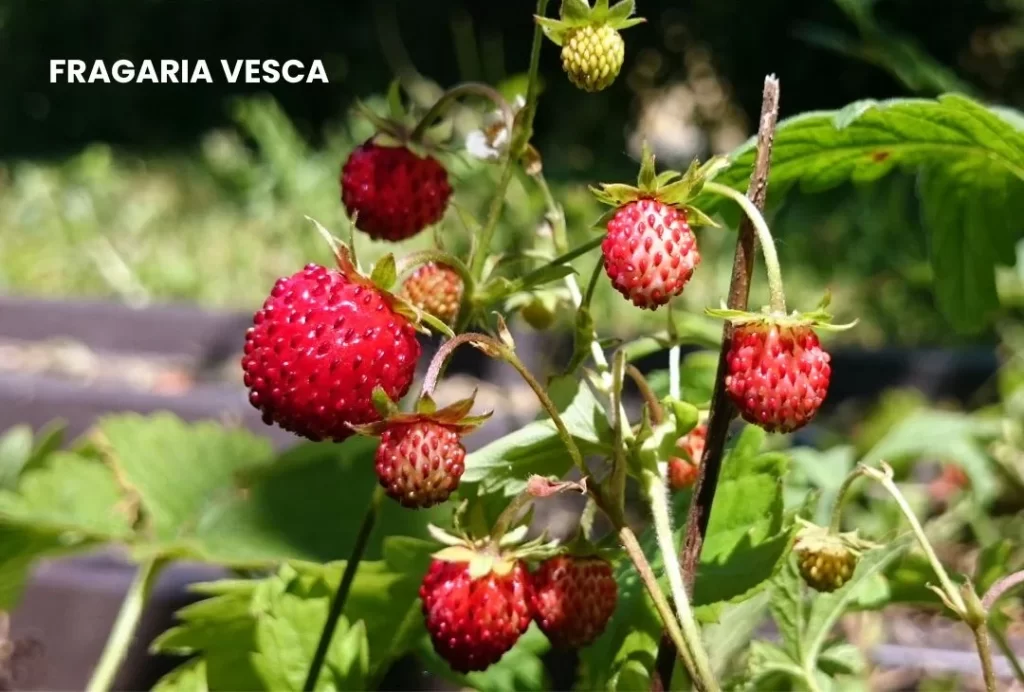Fragaria vesca, commonly known as Wood Strawberry, is a small perennial herb found in the wild across various regions.
Known for its delicious and nutritious fruit, Fragaria vesca also holds significant medicinal properties.
It is particularly noted for its effects on digestion, mesenteric glands, and its ability to prevent the formation of calculi (stones) and remove tartar from teeth.
The fruit also has refrigerant properties and can produce symptoms of poisoning, such as urticarial rashes, in susceptible individuals.

Table of Contents
ToggleSOURCE INFORMATION
Scientific Classification
- Kingdom: Plantae
- Clade: Angiosperms
- Clade: Eudicots
- Clade: Rosids
- Order: Rosales
- Family: Rosaceae
- Genus: Fragaria
- Species: F. vesca
Common Names: Wood Strawberry, Wild Strawberry
Origin: Fragaria vesca is native to the temperate regions of the Northern Hemisphere, including North America, Europe, and Asia.
It grows in a variety of habitats, including woodlands, meadows, and slopes.
Historical Facts
- Traditional Use: Historically, Fragaria vesca has been used both as a food and as a medicinal plant. The leaves, roots, and fruit have been used to treat various ailments.
- Introduction to Homeopathy: The plant was introduced to homeopathy due to its observed effects on digestive health, prevention of gout, and its ability to manage urticarial reactions in sensitive individuals.
DRUG PATHOGENESIS
Fragaria vesca acts on
- Digestive System: Improves digestion and acts on the mesenteric glands.
- Teeth: Prevents tartar formation and maintains dental health.
- Kidneys: Prevents the formation of calculi (stones).
- Skin: Manages urticarial rashes and other skin eruptions.
KEY CHARACTERISTICS
- Digestive Health: Acts on digestion and mesenteric glands, improving overall digestive function.
- Calculi Prevention: Prevents the formation of kidney and bladder stones.
- Dental Health: Removes tartar from teeth and prevents dental issues.
- Gout Prevention: Prevents attacks of gout by managing uric acid levels.
- Urticaria: Manages allergic reactions and rashes caused by strawberries.
- Chilblains: Worsens during hot weather, indicating its use in managing this condition.
- Lack of Mammary Secretion: Addresses issues related to insufficient milk production.
- Psilosis (Spruce): Effective in treating psilosis, a condition characterized by chronic diarrhea and malabsorption.
DETAILED ORGAN SYMPTOMS
MOUTH
- Swollen Tongue: The tongue appears swollen, often described as a “strawberry tongue” due to its appearance.
SKIN
- Urticaria: Allergic skin reactions causing red, itchy welts.
- Petechial Eruptions: Small, red or purple spots on the body caused by bleeding.
- Erysipelatous Eruptions: Acute skin infection leading to red, swollen, and hot areas on the skin.
- Whole Body Swelling: Generalized swelling of the body.
MODALITIES
- Better: Symptoms improve in cool conditions.
- Worse: Symptoms worsen during hot weather.
RELATIONSHIP WITH OTHER DRUGS
Compare with:
- Apis: Used for similar skin conditions, especially urticarial rashes.
- Calcarea: Known for its effects on digestion, skin, and general health.
DOSE
- High Potency: Fragaria vesca is typically administered in high potencies, especially in cases of urticarial reactions and other severe symptoms.
Frequently Asked Questions
What conditions does Fragaria vesca treat?
- Fragaria vesca treats digestive issues, prevents the formation of calculi, removes tartar from teeth, prevents gout, manages urticarial rashes, and addresses chilblains and lack of mammary secretion.
How is Fragaria vesca administered?
- Fragaria vesca is administered in high potencies, often in the form of homeopathic dilutions.
Are there any specific symptoms that indicate the use of Fragaria vesca?
- Yes, symptoms such as swollen tongue, urticarial rashes, petechial and erysipelatous eruptions, whole body swelling, and digestive issues indicate the use of this remedy.
Meaning of Difficult Words
- Calculi: Stone-like concretions that can form in the kidneys or bladder.
- Mesenteric Glands: Lymph nodes located in the mesentery, which is the fold of tissue that attaches the intestines to the abdominal wall.
- Urticaria: Also known as hives, it is a skin condition characterized by red, itchy welts.
- Chilblains: Painful inflammation of small blood vessels in the skin, usually due to repeated exposure to cold.
- Psilosis: A chronic digestive disorder involving malabsorption and chronic diarrhea.
- Erysipelatous: Relating to erysipelas, an acute infection of the skin characterized by red, swollen, and hot areas.
